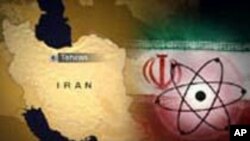Germany and the five permanent members of the United Nations Security Council - Russia, Britain, China, the U.S., and France - have agreed to seek a new U.N. Security Council resolution against Iran over its nuclear program. The Security Council has already passed two resolutions imposing sanctions on Iran because the Iranian government refuses to suspend its uranium-enrichment and other proliferation sensitive nuclear activities. Such activities can support Iran's acquisition of a nuclear weapons capability.
<!-- IMAGE -->Germany's Foreign Minister Frank-Walter Steinmeier announced the decision by the six countries, known as the P5+1. He said, We are in agreement that a nuclear weapon in Iran's hands would have dramatic consequences for the region. So we are and remain agreed that we must and will continue to work together, and with determination to ensure that it does not happen.
A U.S. State Department spokesman, Gonzalo Gallegos, said the P5+1's decision to seek a new resolution sends a strong message to Iran:
It [the Iranian government] needs to comply with U-N Chapter Seven resolutions. They're becoming increasingly isolated, and I think this shows that they aren't able to divide us in our commitment to this effort.
<!-- IMAGE -->U.S. Secretary of State Condoleezza Rice said that the United States believes that the matter can be resolved through diplomacy. Should Iran suspend its uranium enrichment and reprocessing activities - which is an international demand, not an American one, she said, we could begin negotiations, and we could work over time to build a new, more normal relationship. But, said Secretary of State Rice, We do not want Iran to become a nuclear weapons power, and. . . .we will continue to hold Iran to its international obligations.




